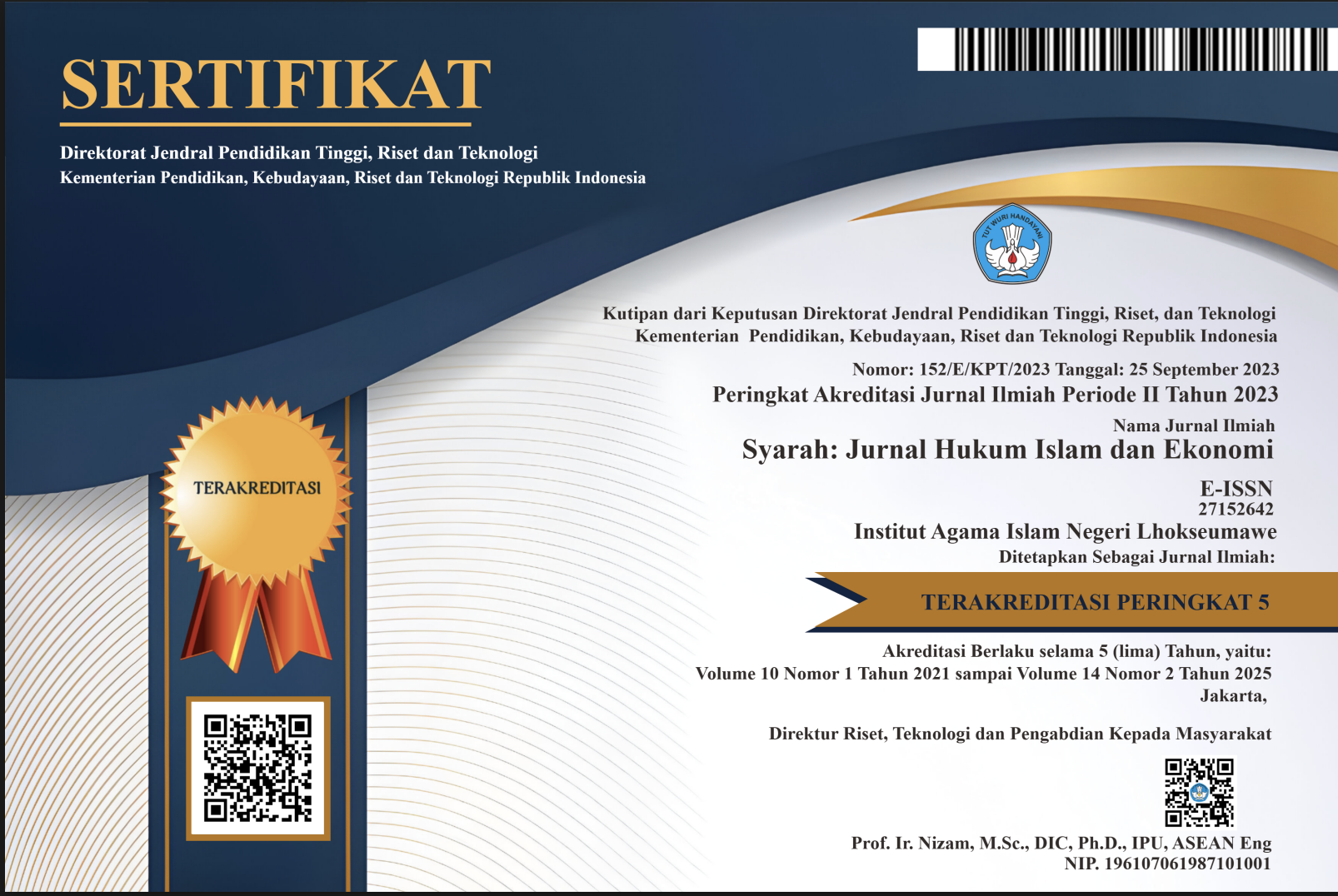Review of Law Number 41 of 2004 Regarding the Practice of Swapping (Ruislag) of Mosque Waqf Land Outside the Context of Public Interest in Wringinputih Village, Banyuwangi Regency
Main Article Content
Dewi Siti Khasanah
Moh. Syifaul Hisan
The practice of waqf in Indonesia has undergone modernization, including the management of waqf assets, which is often carried out through exchanges or swaps to maximize their benefits. Although the legality of such exchanges is clearly regulated under Law Number 41 of 2004, cases in the field still reveal violations of these regulations. This condition is driven by a lack of awareness regarding the importance of preserving waqf assets for community welfare and insufficient understanding of the applicable legal provisions. This research aims to investigate the practice of land exchange (ruislag) involving mosque waqf land conducted without considering public interest, focusing on the legal framework outlined in Law Number 41 of 2004 concerning Waqf. The study employs a qualitative approach, using the village of Wringinputih, Muncar subdistrict, Banyuwangi regency, as a case study. The research methods include observation, in-depth interviews with relevant parties, and analysis of related legal documents. The findings reveal that the practice of exchanging mosque waqf land in Wringinputih Village, Banyuwangi Regency, unrelated to public interest, occurred due to an offer from a particular party to exchange land. However, the land's status had not been officially transferred to the mosque. A prior agreement had been made between the heirs and the party involved in the land exchange. Following the handover, the mosque accepted and received the waqf. An examination of Law Number 41 of 2004 indicates that the land exchange practice involving the waqf land of Bustanul Arifin Mosque in Wringinputih Village, Banyuwangi, did not fully comply with the regulations. The discrepancies include the exchange being motivated by personal interest, the uncertified status of the land, and the lower value of the replacement land compared to the original.
‘Abidin, Ibn. Hasyiyah Radd Al-Muhtar. Mesir: Mushthafa al-Babiy al-Halabiy, 1966.
Abas, Syamsurizal. “Tukar Guling Tanah Wakaf Dan Penarikan Kembali Harta Benda Wakaf.” Jurnal Al-Mizan Vol. 17, no. No. 2 (2021): 259. https://doi.org/DOI:10.30603/am.v17i2.2334.
Al-Bantani, Imam Nawawi. Nihayah Al-Zain Fi Irsyad Al-Mubtadi’in. Beirut: Dar al-Kutub al-’Ilmiyah, 2002.
Al-Syarqawi. Hasyiyah Al-Syarqawi. Beirut: Dar al-Kutub al-’Ilmiyah, 1997.
Al-Zuhaili, Wahbah. Al-Fiqh Al-Islamiy Wa Adillatuh. Damaskus: Dar al-Fikr, n.d.
Fahruroji. Wakaf Kontemporer. Jakarta: Badan Wakaf Indonesia, 2019.
Fikri, A.B. Zainul. “Aksanaan Wakaf Lisan Dalam Konteks Undang-Undang Nomor 41 Tahun 2004 Tentang Wakaf: Studi Di Kabupaten Blitar, Jawa Timur, Indonesia.” Jurnal Supremasi Vol. 6, no. 1 (2016).
Hisan, Moh. Syifa’ul. Pengantar Manajemen Ziswaf Di Indonesia. Edited by Badrut Tamam. Yogyakarta: CV. Bildung Nusantara, 2024.
Indonesia, Sekretariat Negara Republik. KUH Perdata (1847).
———. Undang-undang Nomor 41 Tahun 2004 tentang Wakaf (2004).
Kamariah, Sukman, and Nirwana. “Problema Wakaf Di Indonesia.” Ats-Tsarwah: Jurnal Hukum Ekonomi Islam 1 (2021): 52–68.
Margaretha. “Pelaksanaan Wakaf Wasiat Dan Akibat Hukumnya Ketika Harta Warisan Dipailitkan.” Acta Comitas: Jurnal Hukum Kenotariatan Vol. 05, no. 1 (2020): 59.
Melynia, Shely, Ema Fathimah, and Gibtiah. “Kedudukan Sertifikat Sebagai Alat Bukti Yang Kuat Menurut Hukum Positif Dan Hukum Islam.” Muqaranah Vo. 6, no. 1 (2022): 45. https://doi.org/https://doi.org/10.19109/muqaranah.v6i1.12253.
Nurhaini. “Perlindungan Hukum Tanah Wakaf Yang Tidak Bersertifikat Di Kabupaten Enrekang.” Jurisprudentie Vol. 6, no. 2 (2019): 226. https://doi.org/https://doi.org/10.24252/jurisprudentie.v6i2.9767.
Penyusun, Tim. Fikih Ruislag. Jakarta: Badan Wakaf Indonesia, 2015.
Sarmo. “Hukum Perubahan Status Harta Benda Wakaf ( Studi Kasus Perubahan Status Kepemilikan Tanah Wakaf Di Desa Keniten Kecamatan Kedungbanteng Kabupaten Banyumas ).” Al-Manāhij: Jurnal Kajian Hukum Islam Vol. 14 No, no. 41 (2020): 239–50. https://doi.org/DOI: https://doi.org/10.24090/mnh.v14i2.3216.
Sulistiani, Siska Lis. Pembaruan Hukum Wakaf Di Indonesia. Bandung: PT Refika Aditama, 2017.
Triwahyuni, Putih Nurfitriani. “Dampak Hukum Terhadap Wasiat Tanpa Akta Notaris.” JIMHUM: Jurnal Ilmiah Mahasiswa Hukum Vol. 2, no. No.3 (2022).














